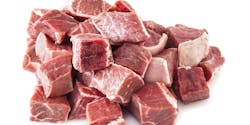Biden Pledges $1 Billion of Rescue Funds to Small, Independent Meatpackers
President Biden virtually met with independent farmers Jan. 3 alongside Secretary of Agriculture Tom Vilsack and Attorney General Merrick Garland to discuss what he called stifling consolidation in the U.S. meats industry and announce new measures to counteract it. To boost competition, Biden and Secretary Vilsack said the administration would clear $1 billion in spending from the COVID relief bill passed last year for grants and loans for small and independent meatpacking companies.
The funds, according to Vilsack, will include $800 million in grants and loans for small and independent meat processing companies, $100 million in loans earmarked to help assuage the industry’s supply-chain challenges and $100 million to reduce the cost of inspections for the smallest meatpacking facilities.
The loan guarantees for supply chain expansions, Vilsack said, would go toward industry-specific solutions like cold storage and potentially result in ten times its initial investment: “We believe this $100 million will leverage nearly a billion dollars of investment,” he said.
In his own remarks, Biden focused on consolidation’s affect on prices, saying that 50 years ago ranchers received 60 cents for every dollar spent by a consumer on meat, while today that figure has dropped to 39 cents, and noting that the price of a pound of beef has leapt during the pandemic.
According to the Associated Press, meat prices have climbed 16% year-over-year, and beef prices have risen more than 20% over the same period.
“Without meaningful competition, farmers and ranchers don’t get to choose who they sell to—put another way, our farmers and ranchers have to pay whatever these four companies say they have to pay, by and large,” said Biden, who added that meat producers can also use their leverage to “overcharge grocery stores and ultimately families.”
Without naming names, the White House Monday noted that the top four beef-processing companies in the U.S. collectively control 85% of its beef production, while the top four pork and poultry-processing firms control 70% and 54% of their own respective markets.
That’s consistent with USDA data from 2021, which shows that Cargill U.S., Tyson Foods Inc., JBS SA and National Beef Tracking Co. slaughtered 85% of U.S. grain-fattened cattle for consumer products.
In its response, the National American Meat Institute insisted the latest announced moves were mistaken and would hurt, rather than help, producers and consumers of meat. In a statement, NAMI CEO Julie Anna Potts accused the Biden administration of “refusing to engage” with meatpackers and noting that the day’s roundtable didn’t include any industry representatives.
“Press conferences and using taxpayer dollars to establish government-sponsored packing and processing plants will not do anything to address the lack of labor at meat and poultry plants and spiking inflation across the economy,” Potts said. She went on to note that producers are currently seeing a trend of increasing prices for cattle as industry members process a backlog caused by COVID disruptions.
While the White House casts the consolidation of meatpacking companies as a liability for supply chains, Mark Dopp, a VP of NAMI, said last year the “ultimate black swan event” of COVID does not indicate the system as it exists needs to be dismantled and that meatpacking consolidation is not new.
In a letter to the USDA submitted in June 2021, Dopp noted that the four-company share of slaughtered cattle had changed little for about a quarter century and claimed the existing model’s efficiency allows meatpacking companies to pass savings to consumers, resulting in cheaper food as a percentage of personal income for American consumers. Instead of funding smaller meatpacking companies or building extra capacity, Dopp said, the USDA should instead focus on a more uniform pandemic response plan and alleviating labor shortages.
NAMI submitted the comments last year in response to the USDA’s request for comment on the measures, which went out in April 2021 after President Biden signed an executive order in February on anticompetitive practices. The January 3 announcement itself builds on an executive order signed in July of last year that directed the USDA to closely enforce price-fairness acts through its Packers & Stockyards division.
A previous version of this article misquoted President Biden on the amount of money ranchers receive per dollar spent on beef. He said ranchers now receive 39 cents per dollar spent, not 59 cents. We regret the error.
About the Author
Ryan Secard
Associate Editor
Ryan Secard joined Endeavor B2B in 2020 as a news editor for IndustryWeek. He currently contributes to IW, American Machinist, Foundry Management & Technology, and Plant Services on breaking manufacturing news, new products, plant openings and closures, and labor issues in manufacturing.
